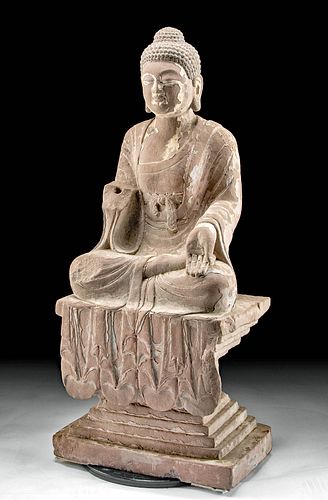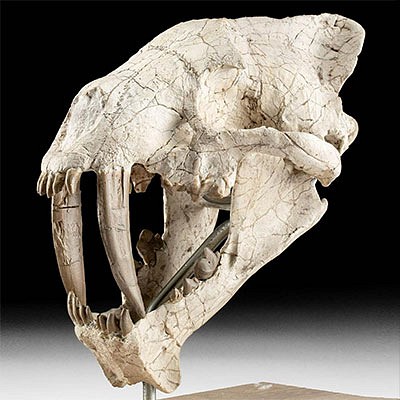Tang Dynasty Stone Seated Buddha / Shakyamuni
Lot 29
About Seller
Artemis Fine Arts
686 S Taylor Ave, Ste 106
Louisville, CO 80027
United States
Selling antiquities, ancient and ethnographic art online since 1993, Artemis Gallery specializes in Classical Antiquities (Egyptian, Greek, Roman, Near Eastern), Asian, Pre-Columbian, African / Tribal / Oceanographic art. Our extensive inventory includes pottery, stone, metal, wood, glass and textil...Read more
Categories
Estimate:
$11,000 - $16,500
Absentee vs Live bid
Two ways to bid:
- Leave a max absentee bid and the platform will bid on your behalf up to your maximum bid during the live auction.
- Bid live during the auction and your bids will be submitted real-time to the auctioneer.
Bid Increments
| Price | Bid Increment |
|---|---|
| $0 | $25 |
| $300 | $50 |
| $1,000 | $100 |
| $2,000 | $250 |
| $5,000 | $500 |
| $10,000 | $1,000 |
| $20,000 | $2,500 |
| $50,000 | $5,000 |
| $100,000 | $10,000 |
| $200,000 | $20,000 |
About Auction
By Artemis Fine Arts
Jul 13, 2021
Set Reminder
2021-07-13 12:00:00
2021-07-13 12:00:00
America/New_York
Bidsquare
Bidsquare : Fauna, Flora, Stones & Bones
https://www.bidsquare.com/auctions/artemis-gallery/fauna-flora-stones-bones-7214
Join us for a very special summer auction featuring fabulous fossils, rocks, and minerals, plus art depicting flora and fauna from antiquity to present day. This is one you won't want to miss! Artemis Fine Arts info@artemisgallery.com
Join us for a very special summer auction featuring fabulous fossils, rocks, and minerals, plus art depicting flora and fauna from antiquity to present day. This is one you won't want to miss! Artemis Fine Arts info@artemisgallery.com
- Lot Description
East Asia, China, Tang Dynasty, ca. 618 to 907 CE. A finely carved and stuccoed stone Buddha (Shakyamuni, the Enlightened form), dressed in traditional robes with an elegant knotted waist sash/belt and seated in full lotus position atop a throne with draped fabric, perhaps silk, cascading over the front, his outward facing left hand suggesting the abhaya mudra, the "gesture of fearlessness". Buddha's contemplative peaceful visage is comprised of downcast eyes, an elegant nose, pursed lips, and characteristically elongated ears - all topped by a curled ushnisha. Imbuing the piece with additional beauty and wonder are the liberal remains of polychrome stucco, suggesting that the statue was once quite colorful with hues of perhaps red, gold, and blue. Size: 8.75" L x 14.75" W x 32.25" H (22.2 cm x 37.5 cm x 81.9 cm)
Buddha's robes are skillfully rendered, draped in a naturalistic way, while his facial features are serene and lifelike. His hair is styled with the classic large ushnisha that indicates his enlightenment. The statue presents a peaceful countenance with the visage featuring a rounded ushnisha symbolizing the wisdom and knowledge acquired after attaining enlightenment, as well as elongated ears, a physical feature symbolic of the Buddha's time as a prince when he wore elaborate ear ornaments to demonstrate wealth and prosperity. Of course, the prince stopped wearing them when he left the palace to become an ascetic; however, his earlobes remained stretched signifying a conscious decision to reject the material world in exchange for spiritual enlightenment and simultaneously suggest that the Buddha can hear all that is asked for and needed in the earthly world. Those half-closed eyes indicate a meditative state - at once looking both outward and inward. Beyond the multi-layered meaning embodied in the iconography of this piece, the sculptor's artistry and technique are very impressive.
Provenance: private Hawaii, USA collection; Ex Micky Micklautz collection, Honolulu, Hawaii USA, 1945 to 1990
All items legal to buy/sell under U.S. Statute covering cultural patrimony Code 2600, CHAPTER 14, and are guaranteed to be as described or your money back.
A Certificate of Authenticity will accompany all winning bids.
PLEASE NOTE: Due to recent increases of shipments being seized by Australian & German customs (even for items with pre-UNESCO provenance), we will no longer ship most antiquities and ancient Chinese art to Australia & Germany. For categories of items that are acceptable to ship to Australia, please contact us directly or work with your local customs brokerage firm.
#161288Missing right hand. Chips to peripheries of base and high-pointed areas. Expected surface wear with loss to stucco, but ample traces of the polychrome stucco finish remain.Condition
- Shipping Info
-
All shipping is handled in-house for your convenience. Your invoice from Artemis Gallery will include shipping calculation instructions. If in doubt, please inquire BEFORE bidding for estimated shipping costs for individual items.
-
- Buyer's Premium



 EUR
EUR CAD
CAD AUD
AUD GBP
GBP MXN
MXN HKD
HKD CNY
CNY MYR
MYR SEK
SEK SGD
SGD CHF
CHF THB
THB














